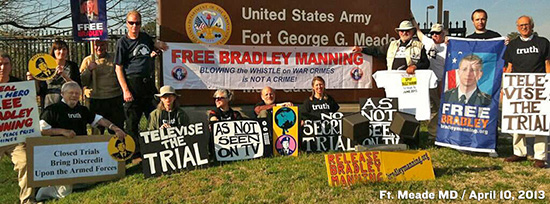Bradley Manning hearing, 4/10/13: partial victory for defense, new media restrictions

Supporters rally outside Ft. Meade, April 10, 2013, calling for an end to the secrecy surrounding Bradley’s trial.
By Nathan Fuller. April 10, 2013.
Judge Denise Lind denied one government motion and one defense motion in Bradley Manning’s one-day pretrial hearing at Ft. Meade, MD.
The government charged Bradley under the information clause (section e) of the Espionage Act, which requires prosecutors to prove that Bradley had “reason to believe could be used to the injury of the United States or to the advantage of any foreign nation.” Prosecutors then tried to lower the burden to remove that “reason to believe” requirement, but Judge Lind denied that motion, retaining the burden of proof.
That ruling will play a key role in how the defense is allowed to proceed: lawyer David Coombs will contest the argument that Bradley believed that this information would harm the U.S.
Bradley has made clear that he released information to expose “bloodlust” in America’s wars and “backdoor deals and seemingly criminal activity” in its diplomacy. As he said of the State Department documents in his statement last month,
“I believed that the public release of these cables would not damage the United States; however, I did believe that the cables might be embarrassing, since they represented very honest opinions and statements behind the backs of other nations and organizations.”Government allowed to present provocative evidence
In another ruling, Judge Lind denied the defense’s motion to preclude the government from showing evidence that Osama bin Laden received documents that WikiLeaks released. The government says it has to prove that the enemy actually received intelligence to prove that Bradley “aided the enemy,” citing case law supporting that contention.
But the defense argued that receipt is not mentioned in the ‘giving intelligence’ subsection of Article 104 itself, and that under another subsection, it explicitly states, “No response or receipt by the enemy is required.”
The defense says that the government is attempting to over-prove its own case just so that it can introduce the politically and emotionally loaded – if not destructively misleading – documents from bin Laden’s compound. The defense argued the material is not only legally irrelevant, it’s also prejudicial to Bradley and likely to distract from the essential issues of this case.
Judge Lind disagreed, siding with the government and ruling that it does need to prove that the enemy received the information for the “aiding the enemy” offense to have been committed.
The government will therefore be allowed to call on ‘John Doe,’ presumed to be a member of Navy SEAL Team 6, whose identity remains classified. The government has invoked a classified privilege on John Doe, attempting to block the defense from interviewing him before trial. It is also trying to prevent the defense from cross-examining him – which is Bradley’s due process right.
Media threatened following audio leak
Additionally, before this morning’s rulings were announced, a military representative came into the media operations center to announce a new rule for journalists following last month’s release of a recording of Bradley’s statement. Cell phones are no longer allowed into the media room. ‘This media facility is a privilege not a right,’ she said. ‘Privileges can be taken away.’
Update, 4:00 PM ET: Court is in recess until May 7-8, when the parties will hold a closed session with sample government witnesses, to determine whether the classified information that they intend to divulge at trial will require closing those sessions or whether an alternative is feasible. Alternatives include summarizing, substituting, or redacting classified information, or using code words to refer to classified names, dates, or places.
Judge Lind ruled that the government will be allowed to call their ‘John Doe’ witness in a different location, with a disguise, as long as the defense will be able to view his demeanor.
If other issues arise before May 7, those will be addressed in a brief open session before the court closes. The next open session after that is scheduled for May 21-24. Trial is still scheduled to begin June 3.

No comments:
Post a Comment